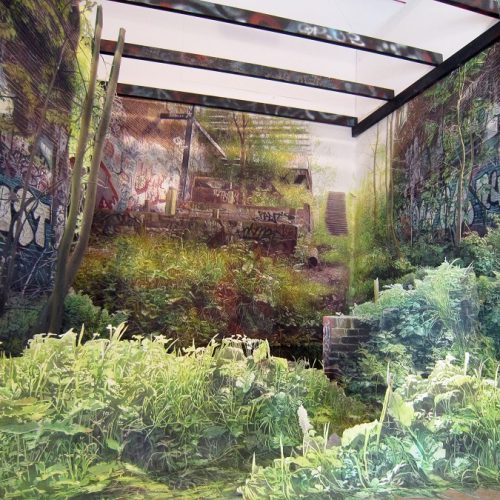
In conversation with: Arts & environment tutor Dan Robinson
It’s the bicentenary of John Ruskin’s birth this year so it is timely to consider his pedagogy and how it may still be relevant today.
Ruskin was a gifted artist, amateur geologist, botanist, etymologist, mythologist, and early environmentalist. He believed that art has the power to expose universal truths, and that a good artist should do just that. He had a passionate advocacy of a sustainable relationship between people, craft and nature and the desire to learn through doing was the motive force behind much of his work.
With this is mind
- Do you think Ruskin’s teachings are relevant today?
Yes! So relevant and quite amazing how his work and influence is so far reaching and crops up everywhere. Recently, I keep coming across projects directly inspired by him.
Only today, I’m looking into school options for my son who has special educational needs. One option is a Ruskin Mill college, who quote in their methods:
Fine art is that in which the head, the heart and the hand of man go together
John Ruskin
So on a personal level, I’m thinking hard about holistic education and how Ruskin’s teaching can inspire education and ways of life that integrate practical activity, thinking and our emotions.
- How can the arts be agents of social change?
A few projects I have followed that go some way to answer this are Grizedale Arts, Public Works, Phytology, Company Drinks, Art Utile, MyVillages, Somewhere.org. Going further back legacies of Yoko Ono, the Situationists, Beuys and social sculpture, Cittadellarte and many many others. To list any of them is to leave out too many others!
This summer I went to a really illuminating talk called, ‘How Coniston Changed My Life’ that could equally have been called ‘How Ruskin Changed my Life and the World’. It was all about Ruskin’s influence today. The talk was at the Coniston Institute as part of Grizedale Arts anniversary weekend and was given by Manchester Art Gallery director, Alistair Hudson. It was all about Ruskin’s legacy. I wrote this up for WeAreOCA here.
- Why is important to use art to come into dialogue with what is happening in the world in terms of the climate crisis etc?
I’m paying close attention to the climate emergency, and current global movement to act now on climate change, Extinction Rebellion, and the Global climate rebellion 7-20th Oct, 2019 and inspirational actions of Greta Thunberg. I’m struck by how these calls for change— on massive structural societal and economic levels— can be related back to Ruskin’s teaching on politics, sustainability, craft and nature. Even methods of non-violent direct action has a trajectory, through Gandhi to John Ruskin. A recent local example of these connections being made was a discussion event in Sheffield (July 16th 2019) where Lucy Neal quoted Ruskin throughout the night as part of debating Green New Deal for Sheffield.
Ruskin was a polymath, ie a person of wide knowledge or learning. When thinking about the Arts & Environment project;
- Is it important to encompass an interdisciplinary approach?
Yes!
- How do you think the project will enable students from different subject areas and levels to work together to move in and across the boundaries of their creative discipline?
By providing other ways to focus shared knowledge, tools and theme. To develop new methods that span creative discipline areas. For me, interdisciplinary (and trans-disciplinary and multi-disicplinary) approaches are relevant, not only for working across and between different creative arts practices, but also about working with non-arts problems, tools and knowledges.
- In what ways do you think this way of working will provoke a critical curiosity in societal issues through art making?
It is widely recognised that art and design has a vital role in engaging people with complex and urgent problems. In the age of the anthropocene and climate emergency we humans need to make urgent changes, to adapt and culture new habits in a short space of time. Art making and art and design education have deep learning histories embracing the natural environment.
- You have said that by environment we mean ecology, nature and also working with particularities of place.
- OCA students are situated in a variety of geographic locations taking into account rurality, urbanity, socio economic factors, weather, cultural differences etc. How do you think this broad scope of place and students’ intersectional qualities will shape the project in terms of discussion and output?
Great question. I like the way you paint this picture highlighting the amazing diversity of OCA students here, ‘the variety of geographic locations… rurality, urbanity, socio economic factors, weather, cultural differences.’ This diversity is a fabulous asset and something really special and unique about what OCA can offer. In our Arts & Environment place based visits and online E-meets, I’ve been astounded at the knowledge many OCA students bring into their creative practice from other areas of professional, academic and personal life.
You can join Dan and his colleague Melissa Thompson for an E-meet on 27 November 6-7pm UK time. All welcome!
If you are interested in attending sign up using this form.
Once registered, you can use this link to join the E-meet https://oca.zoom.us/j/418087540
Check out our Arts & Environment online learning resource free to all OCA students. Email [email protected] to be added to the virtual learning environment.
Featured Image: Winner of the John Ruskin prize 2019 Juliette Losq, Proscenium, 2018, Ink and watercolour on paper
|
|



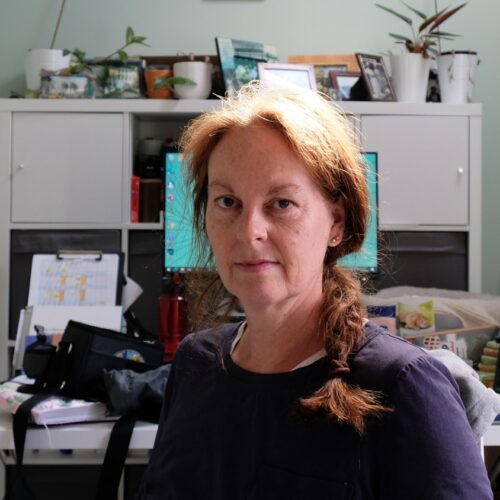
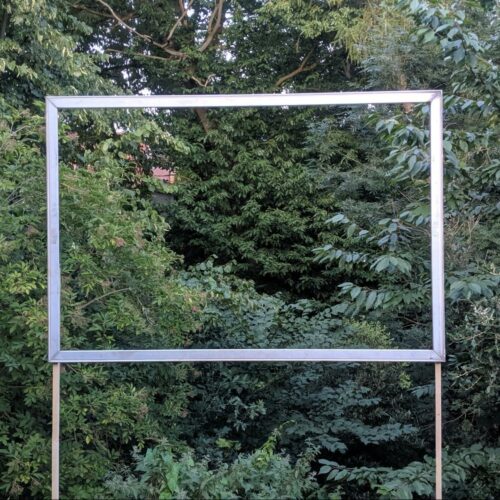
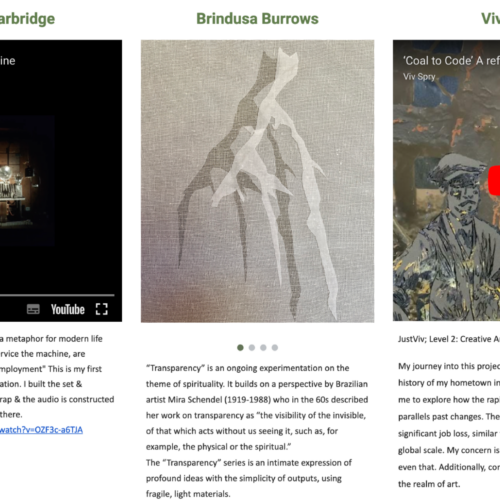
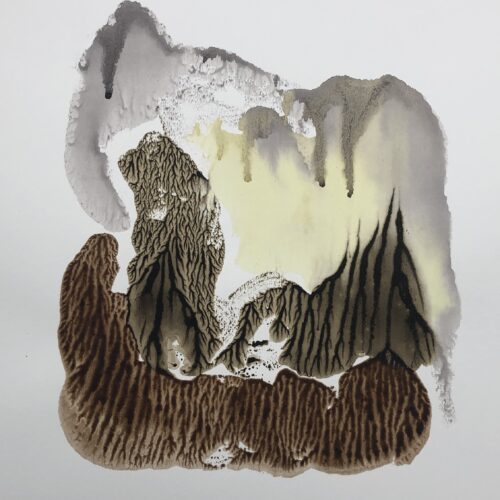
Hi , I’m on drawing 2. . I’ve been active in XR since last November and last 2 weeks of rebellion was an XR trainer each day in trafalgar sq. happy to give a talk to oca students if think interest. Could try and link to art. I am also trying to link all my drawing projects in dr2 to environmental issues 2 and could talk about some of my initial ideas. Last year I did a small installation in a cave which I decided required materials that would biodegrade. I did a lot of research on art materials both plastic snd animal free (my main criteria) that happy to share / also includes research into alternative drawing supports – discovered trees never sustainable for paper no matter the claims. Lastly i am developing ecojustice MA module at ucl and could link to some ideas I have about animal and climate justice. Best wishes, Sue
This sounds great Sue, I hope you can make the November E-meet but if not perhaps something else can be arranged, maybe even a blog post?
Hi Susan, thanks for your response and sorry for my delay. Yes, would be great to hear more about your activities at our next Emeet if you can join us? If not, perhaps we can find another way to share your experience. Blog post? I’d love to hear about your XR experience and if/how that might tie in with your art and ecojustice work – are these all separate threads or do they knit together somehow?… Materials and cave work sounds intriguing!
Always good to see Ruskin getting a shout out! I finished my novel, Brantwood, earlier this year – it focuses on several years of Ruskin’ life, including his efforts to set up a museum in Sheffield to give more people access to art. It also stresses Ruskin’s emphasis on the importance of attentiveness to the world, and how drawing can help us see the world more clearly. It’s incredible how much of an influence Ruskin has been on our current thinking, and on so many topics – from environmental pollution to the importance of fulfulling work. Thanks for this blog, Dan , it’s great to hear about so many others also celebrating Ruskin’s ideas!
Thanks Vicky, when is the novel out? I remember chatting to you about it. Interesting that you’ve been writing about drawing and ‘attentiveness to the world’. Can we have an OCA course on that!? I like how these ideas cut cross disciplines, for me that’s part of the appeal and, as you say, helps make for fulfilling work. Would be great to read your book or more about it.